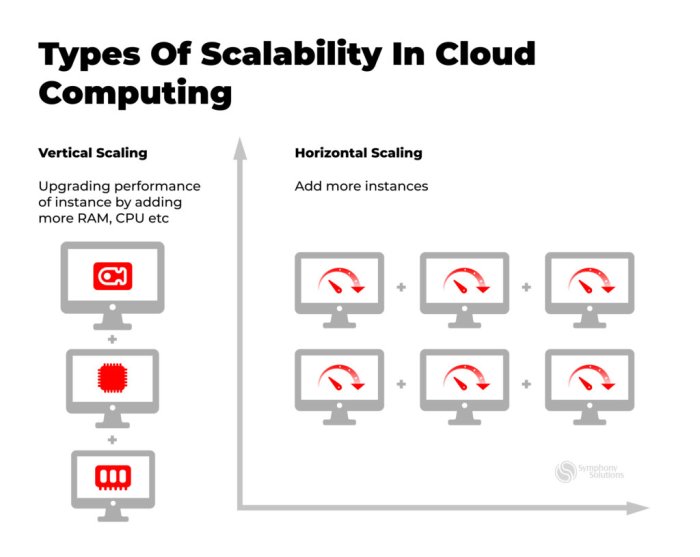Why Cloud Hosting is Ideal for Growing Startups? In today’s dynamic business landscape, startups face constant challenges in scaling their operations, managing costs, and ensuring security. Cloud hosting emerges as a powerful solution, offering a flexible and cost-effective platform to fuel growth and achieve success.
Cloud hosting provides startups with the scalability and flexibility to adapt to changing demands, allowing them to seamlessly scale resources up or down as needed. This eliminates the need for costly upfront investments in hardware and infrastructure, enabling startups to focus on core business activities. Moreover, cloud hosting’s pay-as-you-go pricing model aligns perfectly with the limited budgets of startups, ensuring they only pay for the resources they utilize.
Scalability and Flexibility
Cloud hosting empowers startups to effortlessly adapt to evolving demands, a crucial advantage for businesses navigating the unpredictable landscape of early growth. Unlike traditional hosting, where resources are fixed and often require significant upfront investments, cloud hosting offers the flexibility to scale resources up or down as needed. This dynamic approach allows startups to optimize their infrastructure costs while ensuring seamless performance, regardless of traffic fluctuations or growth spurts.
Dynamic Resource Allocation
Cloud hosting platforms enable startups to allocate resources on demand, paying only for what they use. This eliminates the need for upfront investments in expensive hardware or software licenses. As a startup’s user base grows, it can easily scale its computing power, storage capacity, and other resources to accommodate the increased demand. Conversely, during periods of low activity, startups can reduce their resource allocation, minimizing unnecessary expenses.
Adapting to Fluctuating Traffic
Startups often experience unpredictable traffic patterns, with peaks and dips in activity. Cloud hosting seamlessly accommodates these fluctuations by providing on-demand scalability. For instance, a startup launching a new product might experience a surge in traffic. Cloud hosting automatically scales resources to handle the increased load, preventing performance issues and ensuring a smooth user experience. Conversely, during off-peak hours, the platform automatically adjusts resources to minimize costs.
Cloud hosting allows startups to “pay as they go,” only paying for the resources they actually consume. This dynamic pricing model ensures that startups are not burdened with unnecessary expenses during periods of low activity.
Cost-Effectiveness
Cloud hosting offers a significant advantage for startups in terms of cost-effectiveness. Traditional hosting solutions often involve high upfront investments in hardware, software, and infrastructure, making them a considerable financial burden for young companies with limited resources. Cloud hosting, on the other hand, presents a more affordable alternative with its pay-as-you-go pricing model and flexible scalability.
Cost Comparison with Traditional Hosting
The cost of traditional hosting typically involves:
- Initial Server Purchase: Purchasing servers for traditional hosting can be a substantial expense, especially for startups with limited capital.
- Software Licenses: Operating systems, databases, and other software required for server operation can incur significant licensing costs.
- Infrastructure Maintenance: Maintaining servers, including power, cooling, and network infrastructure, can be costly and require specialized expertise.
- Security and Backup: Implementing robust security measures and data backup solutions adds to the overall cost of traditional hosting.
In contrast, cloud hosting eliminates the need for upfront investments in hardware and software, reducing the initial capital expenditure. The pay-as-you-go pricing model allows startups to pay only for the resources they use, minimizing unnecessary expenses and ensuring cost optimization.
Pay-as-you-go Pricing Model
Cloud hosting providers offer a pay-as-you-go pricing model, where startups pay only for the computing resources they actually consume. This model eliminates the need for upfront investments and allows startups to scale their resources up or down as their business needs evolve.
The pay-as-you-go model offers several benefits for startups:
- Reduced Capital Expenditure: Startups can avoid the substantial upfront costs associated with traditional hosting, freeing up capital for other critical business needs.
- Predictable Expenses: Cloud hosting allows startups to budget their expenses more accurately, as they pay only for the resources they use, ensuring predictable and manageable costs.
- Scalability: The pay-as-you-go model enables startups to easily scale their resources up or down as their business grows, ensuring they have the necessary capacity to meet demand without overspending.
Cost Reduction Examples
Here are some examples of how cloud hosting can reduce upfront investments and ongoing expenses for startups:
- Website Hosting: Instead of purchasing a dedicated server, startups can use cloud hosting services like Amazon Web Services (AWS) or Google Cloud Platform (GCP) to host their websites, paying only for the resources they consume, such as storage and bandwidth.
- Database Management: Cloud databases, such as Amazon RDS or Google Cloud SQL, eliminate the need for startups to purchase and maintain their own database servers, reducing infrastructure costs and simplifying database management.
- Software Development: Cloud-based development platforms like Heroku or AWS Elastic Beanstalk provide startups with a cost-effective and scalable environment for building and deploying applications, eliminating the need for upfront server investments.
Enhanced Security

One of the most significant benefits of cloud hosting for startups is the enhanced security it offers. Cloud providers invest heavily in robust security measures to protect your data, making it a safer environment than managing your own servers. This is especially crucial for startups, as they often lack the resources and expertise to implement comprehensive security solutions.
Data Backup and Disaster Recovery
Data backups and disaster recovery are essential for any business, but they are particularly important for startups. Cloud hosting platforms provide automatic data backups, ensuring that your data is safe even in the event of a hardware failure or a cyberattack. These backups are typically stored in multiple locations, further enhancing data redundancy and availability.
Moreover, cloud providers offer disaster recovery solutions that allow you to quickly restore your data and applications to a new environment in case of a disaster. This ensures business continuity and minimizes downtime, which is crucial for startups trying to establish themselves in the market.
Security Features Offered by Cloud Providers
Major cloud providers like Amazon Web Services (AWS), Microsoft Azure, and Google Cloud Platform (GCP) offer a wide range of security features, including:
- Firewalls: Firewalls act as a barrier between your applications and the internet, blocking unauthorized access and malicious traffic.
- Intrusion Detection and Prevention Systems (IDS/IPS): These systems monitor network traffic for suspicious activity and block potential threats in real-time.
- Encryption: Data is encrypted both in transit and at rest, protecting it from unauthorized access even if the data is intercepted.
- Access Control: Cloud providers allow you to define granular access controls, ensuring that only authorized personnel can access your data and applications.
- Security Audits: Regular security audits ensure that your cloud environment meets industry standards and best practices.
Increased Productivity

Cloud hosting empowers startups to focus on their core business by simplifying IT management and freeing up valuable resources. The cloud eliminates the need for startups to invest in expensive hardware and software, reducing their overhead and allowing them to allocate their budget towards more strategic initiatives.
Streamlined IT Management
Cloud hosting simplifies IT management by centralizing tasks such as server maintenance, software updates, and data backups. Startups can leverage cloud providers’ expertise and infrastructure, freeing up their IT teams to focus on more strategic initiatives, such as developing new products and services. This shift in focus can significantly boost productivity and innovation.
Enhanced Team Collaboration
Cloud-based tools and applications facilitate seamless collaboration among team members, regardless of their location. Cloud-based project management, communication, and file-sharing platforms enable teams to work together efficiently and effectively. These tools enhance communication, streamline workflows, and eliminate the need for physical meetings, ultimately increasing productivity and team cohesiveness.
Examples of Cloud Services
- Cloud Storage: Services like Google Drive, Dropbox, and Microsoft OneDrive offer secure and accessible storage for documents, files, and data, eliminating the need for physical storage and allowing teams to collaborate on projects from anywhere.
- Project Management Tools: Platforms like Asana, Trello, and Jira enable teams to track tasks, manage projects, and collaborate on projects effectively. These tools streamline workflows, improve communication, and enhance team productivity.
- Communication Platforms: Tools like Slack, Microsoft Teams, and Zoom provide instant messaging, video conferencing, and file sharing, facilitating real-time communication and collaboration among team members, regardless of their location.
Global Reach and Accessibility

Cloud hosting empowers startups to transcend geographical boundaries and reach a wider audience, enabling them to expand their operations globally. By leveraging cloud infrastructure, startups can overcome the limitations of traditional hosting methods and establish a presence in new markets without the need for significant upfront investments.
Benefits for Startups with Remote Teams or International Customers, Why Cloud Hosting is Ideal for Growing Startups
Cloud hosting offers numerous benefits for startups with remote teams or international customers. It facilitates seamless collaboration and communication, regardless of location, and enables startups to access resources and services from anywhere in the world.
- Centralized Data Storage and Access: Cloud hosting provides a centralized platform for storing and accessing data, making it readily available to team members across different locations. This eliminates the need for complex file sharing systems and ensures everyone is working with the most up-to-date information.
- Real-time Collaboration Tools: Cloud-based collaboration tools, such as Google Workspace and Microsoft 365, allow team members to work on documents, spreadsheets, and presentations simultaneously, regardless of their physical location. This fosters a collaborative environment and enhances productivity.
- Improved Communication and Connectivity: Cloud hosting facilitates seamless communication and connectivity between team members and customers worldwide. Video conferencing, instant messaging, and email services are readily accessible through cloud platforms, enabling startups to maintain consistent communication and engagement with their global audience.
In conclusion, cloud hosting empowers startups with the scalability, cost-effectiveness, security, and productivity tools needed to thrive in today’s competitive market. By embracing the benefits of cloud computing, startups can unlock their growth potential, streamline operations, and achieve their business goals with confidence.
FAQ Section: Why Cloud Hosting Is Ideal For Growing Startups
What are the main benefits of cloud hosting for startups?
Cloud hosting offers numerous benefits for startups, including scalability, cost-effectiveness, enhanced security, increased productivity, and global reach.
How does cloud hosting compare to traditional hosting for startups?
Cloud hosting provides startups with greater flexibility, scalability, and cost-efficiency compared to traditional hosting. Cloud hosting eliminates the need for upfront investments in hardware and infrastructure, while traditional hosting requires significant capital expenditure.
Is cloud hosting secure for startups?
Cloud providers offer robust security measures to protect startup data. They implement encryption, access controls, and regular security audits to ensure data integrity and confidentiality.
What are some examples of cloud hosting providers?
Some popular cloud hosting providers include Amazon Web Services (AWS), Microsoft Azure, Google Cloud Platform (GCP), and DigitalOcean.